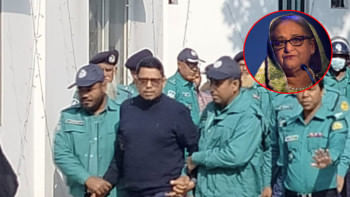Bangladesh to get AIIB focus this year
The Asian Infrastructure Investment Bank plans to lend out $3.5 billion this year, with India, Bangladesh and Turkey to take greater focus than the other 83 member countries, said DJ Pandian, its chief investment officer.
The amount will take the bank's outlay to $7.9 billion in a significant scaling up of lending activities for the two-and-a-half-year-old multilateral development bank, which has committed $4.4 billion to 25 projects thus far.
AIIB's interest rate on loans for public sector projects is priced according to consensus among multilateral lenders: the lowest is 0.75 basis points over LIBOR and the maximum is 1.45 basis points for 35-year tenure, according to Najeeb Haider, its investment operations manager.
“It is reasonably attractive in my view,” he said in a session at the third annual meeting of the bank, which began in Mumbai yesterday.
For private sector loans, the lender does not provide subsidised financing: the interest is as per market rates.
The bank has adequate capital -- $20 billion in cash and another $80 billion in guarantee from various member countries -- and is on the lookout for projects that meet its strategy of: sustainable development, connectivity and mobilising private sector, according to Pandian.
Asia accounts for 50 percent of the global populace but only constitutes 30 percent of the world GDP.
Making countries, many of which are land-locked, more connected through rail and road networks using the resources of the AIIB to boost trade and economic growth can reduce the disparity, Pandian added.
And the reason for wanting to mobilise private capital is that there is persistent stress on public budgets in emerging markets.
“The demand for infrastructure is way beyond what the governments on their own can put up,” Haider said, while urging institutional investors and commercial banks to play a bigger role.
The AIIB is particularly looking to mobilise institutional investors as the latter will have more than $106 trillion assets under management by 2020, according to McKinsey & Company. But a very small portion of that amount would be deployed in infrastructure and that too for developed countries and none for emerging markets.
“Sustainable infrastructure is key in selecting our projects. The projects have to be economically, environmentally and socially sustainable,” said Haider.
Projects pertaining to energy, transport and sustainable cities are of priority to the AIIB at present, he said.
The transport projects must promote trade and economic development, said Thia Jang Ping, AIIB's principal economist. “The bank doesn't have an anti-poverty mandate like the World Bank but it does have an economic growth mandate. So, it is those kind of projects that we are hoping to catalyse more.”
He went on to express particular interest in projects that would better connect India, Bangladesh, and Sri Lanka.
“These areas have connectivity requirements, port requirements, and transhipment requirements. It would be greatly useful for the region,” Ping said, while highlighting the transhipment facility offered by Bangladesh to India's north-eastern region as a case in point.
The AIIB is also looking to fund projects that increase access to clean, safe, affordable, and reliable energy, as it is fundamental to driving sustainable economic growth and ending poverty, said Quan Zheng, its director general for policy and strategy.
The China-led bank is particularly pleased with the way its energy projects in Bangladesh, Myanmar and Egypt are shaping up. Somnath Basu, senior social development specialist of the AIIB, said the lender is working on three energy projects in Bangladesh.
“One is the improvement of distribution and transmission system in and around Dhaka, and this project has been remarkable,” he said.
In Egypt, it has agreed to provide $210 million long-term debt financing to construct 11 photovoltaic solar power plants.
The AIIB is providing $20 million for the development, construction, and operation of a 225MW combined cycle gas turbine power plant in Myanmar.
Meanwhile, the bank yesterday signed an agreement with the Islamic Development Bank to establish a framework for strategic cooperation, including actively seeking to co-finance projects in common areas of operations.
The two-day event will be graced by Indian Prime Minister Narendra Modi today.
A host of interactive sessions on ways to mobilise infrastructure financing, how infrastructure can close gender gaps, and the future of sustainable infrastructure were held yesterday. Indian Finance Minister Piyush Goyal participated in one of the sessions.


 For all latest news, follow The Daily Star's Google News channel.
For all latest news, follow The Daily Star's Google News channel. 



Comments